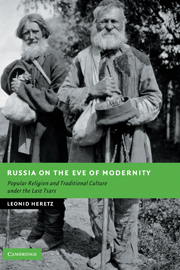Book contents
- Frontmatter
- Contents
- Acknowledgments
- Introduction
- 1 The traditional worldview
- 2 The Old Believers: modernization as apocalypse
- 3 The sectarians: dualism and secret history
- 4 Folk eschatology
- 5 The assassination of Alexander II (1881) and folk Tsarism
- 6 The year of famine and cholera (1891–1892): demonization of the nobility
- 7 The Japanese War: peasant Russia and the wider world
- 8 1905: revolution or reaction?
- 9 The Great War and the crisis of the traditional culture
- Epilogue
- Bibliography
- Index
- NEW STUDIES IN EUROPEAN HISTORY
5 - The assassination of Alexander II (1881) and folk Tsarism
Published online by Cambridge University Press: 23 December 2009
- Frontmatter
- Contents
- Acknowledgments
- Introduction
- 1 The traditional worldview
- 2 The Old Believers: modernization as apocalypse
- 3 The sectarians: dualism and secret history
- 4 Folk eschatology
- 5 The assassination of Alexander II (1881) and folk Tsarism
- 6 The year of famine and cholera (1891–1892): demonization of the nobility
- 7 The Japanese War: peasant Russia and the wider world
- 8 1905: revolution or reaction?
- 9 The Great War and the crisis of the traditional culture
- Epilogue
- Bibliography
- Index
- NEW STUDIES IN EUROPEAN HISTORY
Summary
From time to time, great events such as war and famine would upset the stasis of the traditional life and evoke a popular response sharp enough to pierce the obscurity which hinders our perception of the workings of the traditional mind. The murder of Alexander II was one such cataclysm, and the articulate reaction it engendered allows us entry into the complex of beliefs that comprised the phenomenon of folk Tsarism.
PARAMETERS OF THE QUESTION
The topic of folk Tsarism is one of the most fiercely contested issues in the field of Russian studies. Was Russian peasant monarchism merely an “enduring myth,” or did the Russian peasants “recognize no other authority except that of the Tsar all the way up until the abolition of the autocracy” in 1917? The latter quote points to another aspect of the debate: if Tsarism is accepted as having existed in the past, and there is little question that it formed a crucial part of Muscovite culture, at what point can we say it was dead in popular belief – Bloody Sunday? The elections to the Duma? The frustration of hopes for redistribution of the land in the aftermath of 1905? The abdication of Nicholas II?
The problem of folk Tsarism brings us to the heart of the politicization which has shaped the study of Russia and which has been a major theme of the present work.
- Type
- Chapter
- Information
- Russia on the Eve of ModernityPopular Religion and Traditional Culture under the Last Tsars, pp. 119 - 129Publisher: Cambridge University PressPrint publication year: 2008

